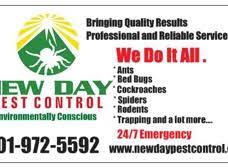Pest control is a crucial aspect of maintaining a healthy and safe living environment. Whether you are a homeowner or a business owner in New Jersey, understanding the nuances of pest control is vital. In this comprehensive guide, we’ll delve into the world of pest management, addressing common pests in New Jersey, the risks associated with infestations, and effective solutions to keep your space pest-free.
Introduction
Definition of Pest Control:
Pest control involves the management of species defined as pests. These can include insects, rodents, and wildlife that pose a threat to human health, property, or the environment.
Importance of Pest Control:
The significance of pest control extends beyond mere inconvenience. Infestations can lead to health risks, property damage, and economic consequences. Understanding the importance of proactive pest management is the first step in safeguarding your home.
Common Pests in New Jersey
Insects:
New Jersey is home to a variety of pests, including ants, mosquitoes, and termites. Understanding the behavior and characteristics of these insects is crucial for effective control.
Rodents:
Rodents such as mice and rats can cause significant damage to property and pose health risks. Implementing strategies to prevent rodent infestations is essential.
Wildlife:
From raccoons to squirrels, New Jersey’s wildlife can become unwelcome guests. Balancing coexistence while ensuring they stay out of your living space requires careful consideration.
Risks Associated with Pest Infestations
Health Risks:
Pests can carry diseases and allergens, posing health risks to residents. Addressing these concerns promptly is essential for a healthy living environment.
Property Damage:
Termites, rodents, and other pests can cause structural damage to buildings. Regular inspections and preventive measures can mitigate the risk of costly repairs.
Economic Impact:
Businesses can suffer economic losses due to pest infestations. Maintaining a pest-free environment is crucial for preserving the integrity of your property and assets.
DIY Pest Control Tips
Prevention Measures:
Simple steps, such as sealing entry points and proper waste management, can prevent pests from entering your home.
Home Remedies:
Natural remedies like vinegar for ants or essential oils for repelling insects are eco-friendly alternatives for minor pest issues.
When to Seek Professional Help:
Knowing when to call in professionals ensures that pest problems are addressed effectively and efficiently. Professionals have the expertise and tools to handle more severe infestations.
Professional Pest Control Services in New Jersey
Importance of Hiring Professionals:
Professional pest control services offer expertise and tailored solutions, ensuring long-term pest management.
Types of Pest Control Services:
Services range from insect control to wildlife removal. Choosing the right service for your specific needs is crucial.
Choosing the Right Pest Control Company:
Researching and selecting a reputable pest control company involves considering factors such as experience, customer reviews, and eco-friendly practices.
Eco-Friendly Pest Control Solutions
Benefits of Eco-Friendly Pest Control:
Eco-friendly methods prioritize the environment and human health while effectively managing pest populations.
Examples of Eco-Friendly Methods:
Natural predators, botanical insecticides, and biological control are examples of eco-friendly pest control methods.
Impact on the Environment:
Reducing the use of harmful chemicals in pest control minimizes the environmental impact and promotes sustainability.
Pest Control Regulations in New Jersey
Overview of Regulations:
Understanding and adhering to pest control regulations in new jersey pest control is essential for both homeowners and pest control professionals.
Compliance and Licensing:
Pest control companies must comply with state regulations, and consumers should verify licenses and certifications when hiring services.
Integrated Pest Management (IPM)
Definition of IPM:
Integrated Pest Management (IPM) is a holistic approach that combines biological, cultural, and mechanical methods with the judicious use of pesticides.
Components of IPM:
Monitoring, prevention, and intervention are key components of IPM, providing a comprehensive strategy for pest management.
Implementation in New Jersey:
The state encourages the adoption of IPM practices, promoting sustainable and effective pest control.

